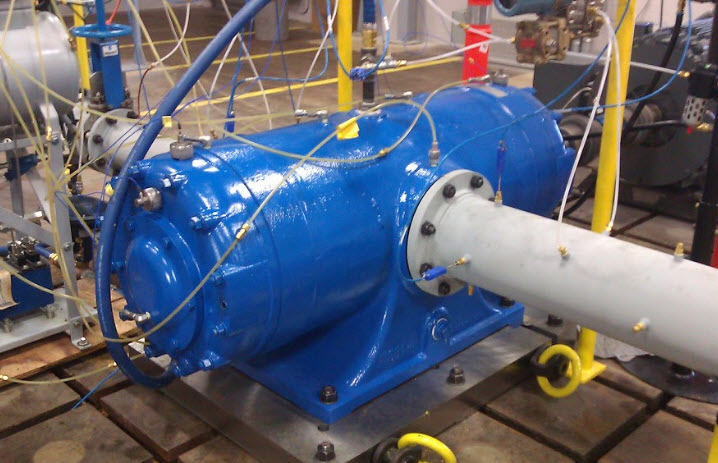Compressor testing can be utilized to validate expected performance, analyze product developments, determine baseline data in a controlled environment, troubleshoot unexpected or undesirable operation and much more. It is often preferable to hire an independent third-party testing service to ensure unbiased results.
Popular and valuable tests that are commonly performed include:
- Performance Test -The purpose of the performance test is to determine the compressor volume flow rate and power consumption in relation to speed, inlet pressure and discharge pressure. Performance testing generally follows ISO 1217 and ASME PTC-9 standards. Test results are typically checked against the expected results to determine if the equipment is within the OEM’s tolerances. Testing can be conducted on air with an open piping loop or with inert gases utilizing a closed piping loop. Test operating pressures can range from vacuum levels to full pressure at the max allowable working pressure.
- Mechanical Run Test – The purpose of the mechanical test is to verify the mechanical integrity and satisfactory build of the compressor. Typical compressor measurements during mechanical tests include process pressures and temperatures, shaft torque/power, jacket cooling heat rejection and casing vibration.
- Vibration Assessment and Analysis – Typically a dynamic signal analyzer is used to continuously monitor, record and analyze vibration measurements from all types of vibration instrumentation. Numerous plot types, including spectral data, are available that can be used for analysis in real time or can be played back for further analysis. Speed reference, data filtering and runout compensation are just a few of the available tools to help diagnose vibration issues such as unbalance, misalignment and bearing faults.
- Critical Speed Map – Typically a dynamic signal analyzer is equipped with high speed data acquisition to record vibration and phase angle to accurately determine locations of critical speeds.
- Troubleshooting and Failure Analysis – Precision and accurate instrumentation of a testing facility leaves no question to the validity of the test results. The controlled lab setting is ideal for uncovering performance issues and analyzing failures.
Benefits of Compressor Testing by Ro-Flo Compressors Rotary Test Center
Ro-Flo Compressors operates a state-of-the-art testing facility managed by experts in the field. The testing department has more than 20 years of experience running various tests on all kinds of compressors to correct problems and gain information that can help to improve the design of future models.
Benefits of letting the Rotary Test Center evaluate your compressor include:
- Unbiased Independent Testing. Sometimes the best analysis can be done when the compressor is removed from all other factors that could affect the operation and performance. That is the only way to determine if there is a problem within the compressor itself.
- Custom Testing Plans. When you need specific assessment done of your equipment, a custom testing plan can be developed for product benchmarking and development performance verification.
- Testing of a Variety of Compressor Types. The Rotary Test Center can assess sliding vane compressors, flooded screw compressors, and liquid ring compressors. Pumps, turbo expanders, and gear boxes can also be tested.
- Testing follows ASME PTC, ISO and API Standards. ASME (American Society of Mechanical Engineers) PTC (Performance Test Codes), ISO (International Organization for Standardization), and API (American Petroleum Institute).
- Data Gathered Influences Future Product Design. The information gained from the various tests done on compressors can help product designers to make improvements on future models so that fewer problems occur and superior products are created.

